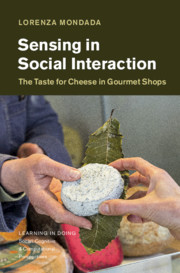Book contents
- Sensing in Social Interaction
- Learning in Doing: Social, Cognitive, and Computational Perspectives
- Sensing in Social Interaction
- Copyright page
- Contents
- Figures
- Tables
- Extracts
- Acknowledgments
- Part I Sensoriality in Interaction
- Part II Looking and Knowing
- Part III Sensing Together
- Part IV Tasting, Assessing, and Making Decisions
- 7 Requests and Offers to Taste: The Sequential Environments of Tasting
- 8 The Anatomy of Tasting
- 9 The Outcome of Tasting: Assessing and Decision-Making
- 10 Conclusion
- Appendix: Transcription Conventions
- Bibliography
- Index
- Series page
9 - The Outcome of Tasting: Assessing and Decision-Making
from Part IV - Tasting, Assessing, and Making Decisions
Published online by Cambridge University Press: 21 October 2021
- Sensing in Social Interaction
- Learning in Doing: Social, Cognitive, and Computational Perspectives
- Sensing in Social Interaction
- Copyright page
- Contents
- Figures
- Tables
- Extracts
- Acknowledgments
- Part I Sensoriality in Interaction
- Part II Looking and Knowing
- Part III Sensing Together
- Part IV Tasting, Assessing, and Making Decisions
- 7 Requests and Offers to Taste: The Sequential Environments of Tasting
- 8 The Anatomy of Tasting
- 9 The Outcome of Tasting: Assessing and Decision-Making
- 10 Conclusion
- Appendix: Transcription Conventions
- Bibliography
- Index
- Series page
Summary
The outcome of tasting as an embodied sensorial practice is, in the context of the gourmet shop, an assessment. This chapter offers a systematic analysis of the way not only assessments are verbally uttered, but also preceded and accompanied by facial expressions and other incarnated manifestations constituting embodied assessments. These are closely witnessed by the seller observing the customer tasting, and in some cases even anticipated by them. Assessments are a type of outcome of tasting that contrasts with outcomes, like descriptors, characterizing other activities – for example in tasting sessions participants rather search for the best word to express the tasting qualities of the sample. Even when minimal, they both address the quality of the sensed item and its coincidence with personal taste and orient to the embeddedness of the sensorial experience within the local actions and the global activity: assessing often retrospectively responds to a previous offer or proposal of the seller and prospectively orients to the closing of the purchase, in the form of a decision about buying (or not, in the case of negative assessments). Thus, assessments are followed by decision-making and often enable the seller to anticipate the latter. Assessments do not only complete the sensory experience of tasting in an intersubjective way but also demonstrate its relevance for broader activities, which reflexively also shape it.
- Type
- Chapter
- Information
- Sensing in Social InteractionThe Taste for Cheese in Gourmet Shops, pp. 420 - 481Publisher: Cambridge University PressPrint publication year: 2021



